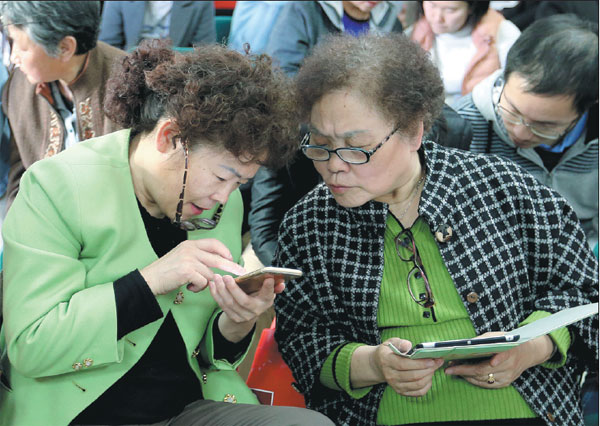'Silver surfers' ride a wave of modernity
Updated: 2016-04-12 07:39
By Peng Yining(China Daily)
|
||||||||
Smartphone classes for seniors in Beijing have resulted in the elderly becoming increasingly tech-savvy and using the mobile internet and instant-messaging apps to stay in contact with family and friends, as Peng Yining reports.
On the 12.7-centimeter screen of her Chinese-made smartphone, Zhao Meixiang saw a former colleague for the first time since she retired more than 10 years ago.
"You have gray hair!" exclaimed the 66-year-old former employee of a domestic service company in Beijing. "Yes, and you have gray hair too," replied the woman on the other end of the video call, prompting delighted laughter and a surge of long-dormant memories.
The call was important to Zhao, who has seen many of her peers lose contact with former colleagues and friends after they retired, gradually sinking into the small, comfortable circle of family life and mostly taking care of their grandchildren.
"The mobile internet is not like other ways of communicating. With our smartphones, we can see each other and follow each other's lives," she said. "It has helped me to resume friendships with long-lost friends and helped me regain my social life."
She used WeChat, China's most popular smartphone instant-mess-aging application, to found nearly 10 chat groups, including some for family and friends, travel and amateur dramatics.
However, her most-successful group is the one that teaches seniors how to use smartphones. The group has more than 60 members, mostly elderly people from her community.
"Younger people showed me how to use my smartphone. It wasn't easy at the beginning, but when I got used to it, my life became more colorful," she said. "Elderly people shouldn't isolate themselves in their homes, and the mobile internet provides us with a perfect platform. I want to bring more people of my age into the digital world."
Getting connected
According to a report published in January by the China Internet Network Information Center, 90 percent of China's 688 million internet users surf the web via smartphones. The proportion age 60 and older rose to 3.9 percent last year, from 2.4 percent in 2014.
"Most elderly people use smartphones for social purposes," said Shi Yaru, a civil servant and social worker in Huayuanzhabeili neighborhood in Gaobeidian township in Beijing.
Since November, Shi has been organizing smartphone classes for seniors in the community, including tutorials on how to access the internet via a phone and how to use apps such as WeChat to send and receive messages.
The classes have proved a run-away success, attracting more than 200 people.
One of Shi's students is a former elementary school headmaster in Beijing who lost contact with the school after retiring, which left him depressed. Now, after learning to use instant-messaging apps, he's back in contact with many of his ex-colleagues and his now-adult former students.
"He told me that social networks have opened a new life for him. Every time his former students and colleagues clicked 'like' under his posts, he felt fulfilled and his feeling of being neglected disappeared," Shi said, adding that many of her students use smartphones to keep in touch with their children.
Huayuanzhabeili has a population of about 7,000, including more than 100 seniors age 65 or older who live on their own.
Earlier this year, the Ministry of Civil Affairs announced that more than 50 million elderly people in China's rural areas live by themselves while their children work in other parts of the country.
Gao Jingguo, a 65-year-old retired farmer, was proud to say that he is always first to arrive for the Wednesday afternoon class, where he sits in the front row.
His daily schedule revolves around getting up at 6 am to take his granddaughter to school at 7 am, and then occupying himself until the 8-year-old is ready to be picked up at 3:30 in the afternoon.
Since he joined the class, Gao has learned how to keep in touch with his friends through instant-mess-aging platforms. He is delighted that he has also learned how to block and delete spam and other e-junk.
"Before I joined the class, I didn't know how to send a message. All I could do was reply when people sent me one," he said. "I tried to ask my son and daughter-in-law, but they are very busy and impatient. Sometimes I asked people in the appliance store for help."
Shi said the "Silver Surfer" class currently has more than 40 regular students, some of whom hail from other communities.
"Many of these grandfathers and grandmothers are very lonely. Teaching them to use smartphones is a way of helping them to get their lives back," she said. "The assistance we can provide is very limited, though, so the support of the family is crucial."
Video calls
At 74, Li Heyang is the oldest member of the class. He taught physics in a Beijing high school for 30 years, but lost contact with many colleagues and friends when he retired. He wanted a smartphone because all his friends had one, so when his daughter upgraded her phone to a newer model, Li took possession of the old one.
Frowning in concentration, he practiced what Shi had just taught him and more than 30 other gray-haired students: How to make a video call via social media.
"Step one: Click the green bubble-like button. Step two: find the contact list. Step three: choose a person. Step four: click on 'video call' (the button looks like a small camera)."
Closely following the notes he had written in a notebook lying open on his knees, Li dialed one of his friends.
After the call went through, Li instantly put the phone to his ear and said "Hello".
"I can only see your ear. You need to put the phone right in front of your face," said the person on the other end. Li and his friend both laughed loudly when they saw each other on screen.
"It is not easy to travel at my age, but the smartphone brings us closer together," Li said. "Young people are using smartphones to post micro blogs, news reports and to book train tickets. I don't want to be left behind."
Every week, 69-year-old Cui Baoguang, who used to work as a schedule manager in a railway control room, makes the three-hour round trip from his home to the class. He used to live in the Huayuanzhabeili neighborhood, but he left when his daughter and her family moved away.
"When you get old, you go wherever your child and grandchild go," Cui said. "But you still want to live your own life, talk to people of your own age, if not face to face, at least through the internet."
Cui said his new digital skills have also helped him to build a closer relationship with his family.
Using a smartphone - the third he has owned - Cui utilized the skills he learned at the class to make a music video featuring photos of his 6-year-old granddaughter.
"I remember how happy my granddaughter was when I showed her my video," said Cui, who uses a photo of the girl as the desktop image on his phone.
"My daughter couldn't believe I made that video. A year ago, I couldn't even find the button to turn on a computer."
He is also learning English on WeChat, and has joined a group chat founded by seniors in his community who are willing to teach and to learn.
He looked up from his phone and spoke in English: "You're never too old to learn."
Contact the writer at pengyining@chinadaily.com.cn
|
Seniors learn how to use social networking applications on their smartphones at a class organized by social workers in the Huayuanzhabeili neighborhood in Beijing on March 30. Wang Zhuangfei / China Daily |

(China Daily 04/12/2016 page6)
- Brazil commission recommends impeachment against Rousseff
- Severe storms rage through southern US states
- DPRK to participates in Paris climate signing ceremony
- Canadian PM to apologize for rejection of Sikh people in 1914
- Envoy to Middle East covers a lot of ground
- India detains 5 as temple fire kills 112

 Unforgettable wedding photos at fire station
Unforgettable wedding photos at fire station
 Jack Ma toasts wine with Italy's prime minister
Jack Ma toasts wine with Italy's prime minister
 Top 10 best airports in the world
Top 10 best airports in the world
 Water fight with elephants in Thailand
Water fight with elephants in Thailand
 Time-tripping steam train in Southwest China
Time-tripping steam train in Southwest China
 Actress Zhang Ziyi celebrates 100th day of her daughter
Actress Zhang Ziyi celebrates 100th day of her daughter
 19-year-old hit by train while taking selfie, dies on the spot
19-year-old hit by train while taking selfie, dies on the spot
 Striking images around world in week: April 4 - April 10
Striking images around world in week: April 4 - April 10
Most Viewed
Editor's Picks

|

|

|

|

|

|
Today's Top News
Duke alumni visit Chinese Embassy
Marriott unlikely to top Anbang offer for Starwood: Observers
Chinese biopharma debuts on Nasdaq
What ends Jeb Bush's White House hopes
Investigation for Nicolas's campaign
Will US-ASEAN meeting be good for region?
Accentuate the positive in Sino-US relations
Dangerous games on peninsula will have no winner
US Weekly

|

|








